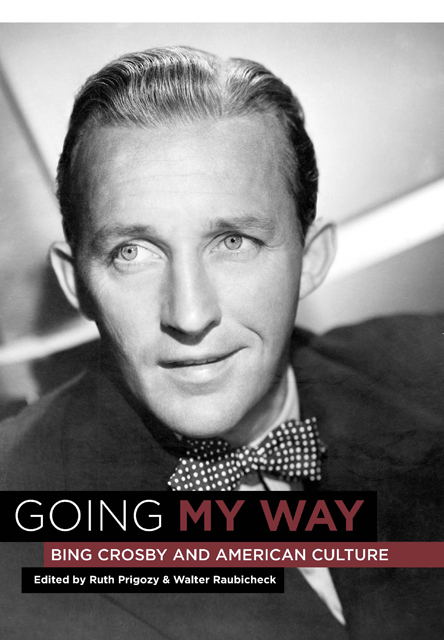Book contents
- Frontmatter
- Dedication
- Contents
- List of Illustrations
- Foreword
- Preface
- Acknowledgments
- Introduction Bing Crosby—Nothing Is What It Seems
- Part 1 Theoretical Perspectives on Crosby
- Part 2 Cultural Perspectives on Crosby
- Part 3 Historical Perspectives on Crosby
- Personal Comments
- Selected Bibliography
- List of Contributors
- Index
1 - Analogies of Ignorance in Going My Way
Published online by Cambridge University Press: 11 March 2023
- Frontmatter
- Dedication
- Contents
- List of Illustrations
- Foreword
- Preface
- Acknowledgments
- Introduction Bing Crosby—Nothing Is What It Seems
- Part 1 Theoretical Perspectives on Crosby
- Part 2 Cultural Perspectives on Crosby
- Part 3 Historical Perspectives on Crosby
- Personal Comments
- Selected Bibliography
- List of Contributors
- Index
Summary
Going My Way (1944) was one of the most successful promotions of Catholicism in American history; successful in part because of its suppression not only of the dark, judgmental aspects of religion, but also because there is almost no reference to the supernatural, the sacramental, or the theological. Rather than characterize Catholicism as superficial and sentimental, or impose some alien theory on a simple story, those looking for the basis of the religious appeal might better consider the numerous analogies of ignorance and its resolution in the film. The religious themes found in Going My Way continue, and in some ways are enhanced, in the sequel The Bells of St. Mary's (1945).
In theology, the analogical method seeks to remove objections to religion by showing that the opponent has already accepted the disputed point in a different context. Once the analogy is made explicit, the objection evaporates—nothing objectionable is left. Going My Way concentrates on one particular analogy of experience: the analogy of ignorance. Ignorance was also a favorite theme of Joseph Butler, author of the Analogy of Religion (1736). Although an Anglican, Butler was accused of Catholic sympathies and John Henry Newman explicitly credits Butler with his own conversion from the Church of England to Rome. The thesis of this paper is not that Butler's work influenced the making of the Father O’Malley films, but rather that Butler provides the clearest theological explanation of their appeal. In other words, there are certain themes the emphasis on which made Butler's works enormously popular, and those same themes are responsible for the popularity of the films.
The most general description of this quality is that the religion in Butler and in the films is naturalized. In Butler one is struck by the many appeals to nature. Even when he appeals to revelation, Butler is careful to stress the analogies between what we experience in the natural world and what we are taught by revelation. Rather than being at odds with what we experience in this world, religion is largely in accord with the course of nature and this is only what we should expect given that the author of divine revelation is also the author of nature.
Information
- Type
- Chapter
- Information
- Going My WayBing Crosby and American Culture, pp. 11 - 16Publisher: Boydell & BrewerPrint publication year: 2007
